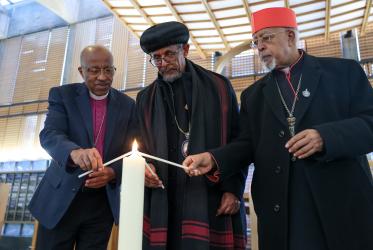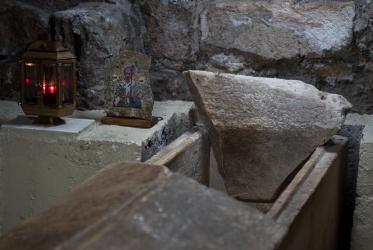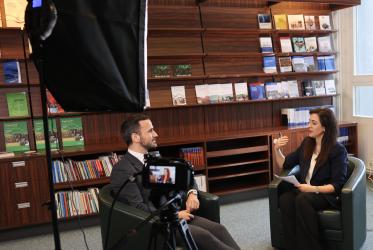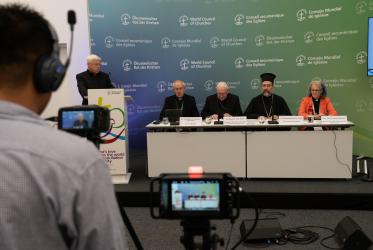On 31 October 2016, Lutherans and Catholics co-hosted for the first time in history a joint commemoration of the 500th anniversary of the Reformation. The events took place in Lund, Sweden, under the slogan “From Conflict to Communion”. Many Orthodox representatives attended the event. What did it mean for them? I cannot respond to this question on behalf of all the Orthodox present, but I will try to explain how I perceived it through my eyes.
In order to understand the significance of this commemoration for an Orthodox, one must ask: how were reformers perceived by the Orthodox in the 16th century? In fact, the Orthodox always considered themselves as “Latins”, that is, in the language of that time, as Western Christians. Indeed, the Reformation became a controversy in the West, setting Roman Catholics and Protestants into opposition. But the Orthodox never took party on any side of the conflict, and never condemned any of them. As a matter of fact, the Orthodox would even use the arguments of one side while disputing with the other. The anti-papist arguments of the Protestants were welcomed by the Orthodox when they were facing uniatism promoted by the Roman Catholics, as arguments of the Roman Catholics were used against Protestant proselytism, especially on the subject of sacraments.
In the 16th-18th centuries, the Orthodox widely used the model of “confessional books” of Protestantism as well as “Catechism” of the Roman Catholics. Two famous examples are the Confession of Patriarch Cyril Lucaris, first published in Latin in Geneva (1629), filled with Calvinistic elements, on the one hand, and the Catechism of Peter Moghila (1640) famous for its pro-Catholic statements, taken in part from the Catechism of Canisius, on the other. Another Confession, the one of Dositheus of Jerusalem (1672), often considered as the most important Orthodox dogmatic text of this period, states that Lutherans who wish to join the Orthodox Church ought to be received in the same way as the Roman Catholics. This shows that for the Orthodox, in the past, Reformers and Catholics were considered as two sides of the same Western Christian medal.
And how did the Reformers consider the Orthodox? In 1519, in his dispute with Johann Eck, Martin Luther himself referred to the Orthodox, stating that they did not acknowledge the universal supremacy of the pope over all the Churches. Luther said on this point: “The Greek Church does not agree on this point and nevertheless is not considered as heretic for that”. Unfortunately, Luther did not have any personal contacts with the Orthodox, which might have slightly modified the Reformation. Nevertheless, Lutheran theologians have sought support from the Orthodox on many occasions. Philip Melanchton had contacts with Greek Orthodox from Venice between 1542 and 1562 and even with the Patriarch of Constantinople Joasaph to whom he sent a letter with a Greek translation of the Augsburg Confession (1559). The same can be seen in the important correspondence of the scholars of Wüttemberg with the Patriarch of Constantinople Jeremiah II (1573-1581). These Lutheran theologians sent the Greek translation of the Augsburg Confession to the Ecumenical Patriarch, asking for his opinion. The Patriarch responded with three letters. Unfortunately, during this correspondence, both sides did not understand each other, and therefore it did not lead to any fruitful result. Seeing that the Lutherans did not understand any of the theological positions of the Orthodox, Jeremiah interrupted this theological dialogue by stating in his third response to the Lutherans: “Continue your path, and from now, do not write to us anymore about dogmas, but only by friendship”. Thus, both sides did not condemn each other and remained friends.
At the beginning of the 20th century, the Ecumenical Patriarch Joachim III raised the question of ecumenical relations of the Orthodox Church with Western Christians in his famous encyclical (1902): “It is, moreover, pleasing to God, and in accordance with the Gospel, to seek the mind of the most holy autocephalous Churches on the subject of our present and future relations with the two great growths of Christianity, viz. the Western Church and the Church of the Protestants”. This encyclical initiated the preparation of the Holy and Great Council of the Orthodox Church, and led at its first stage of preparation, to the convocation of Pan-orthodox conferences of Rhodes (1961-1964) which agreed that the Orthodox Church should engage in bilateral dialogues with the other Christian Churches. Since these Pan-orthodox conferences, the Orthodox Church has started several bilateral dialogues in which representatives from every local autocephalous Orthodox Church have been participating. The dialogue with the Lutherans is being conducted with the Lutheran World Federation since the first meeting in 1981 in Espoo (Finland).
Having this in mind, it is clear that the Lund commemoration, seen in the eyes of an Orthodox, could only be welcomed, since it contributes to the rapprochement of the divided Christians on their path towards unity. The process of “purification of memories” among Western Christians may thus lead from “conflict to communion”. Perhaps not a full Eucharistic communion, but nonetheless towards a mutual understanding, which may help for a more global communion, East and West. This is our Orthodox prayer “for the union of all” in a friendship that has never ceased with all Western Christianity.






